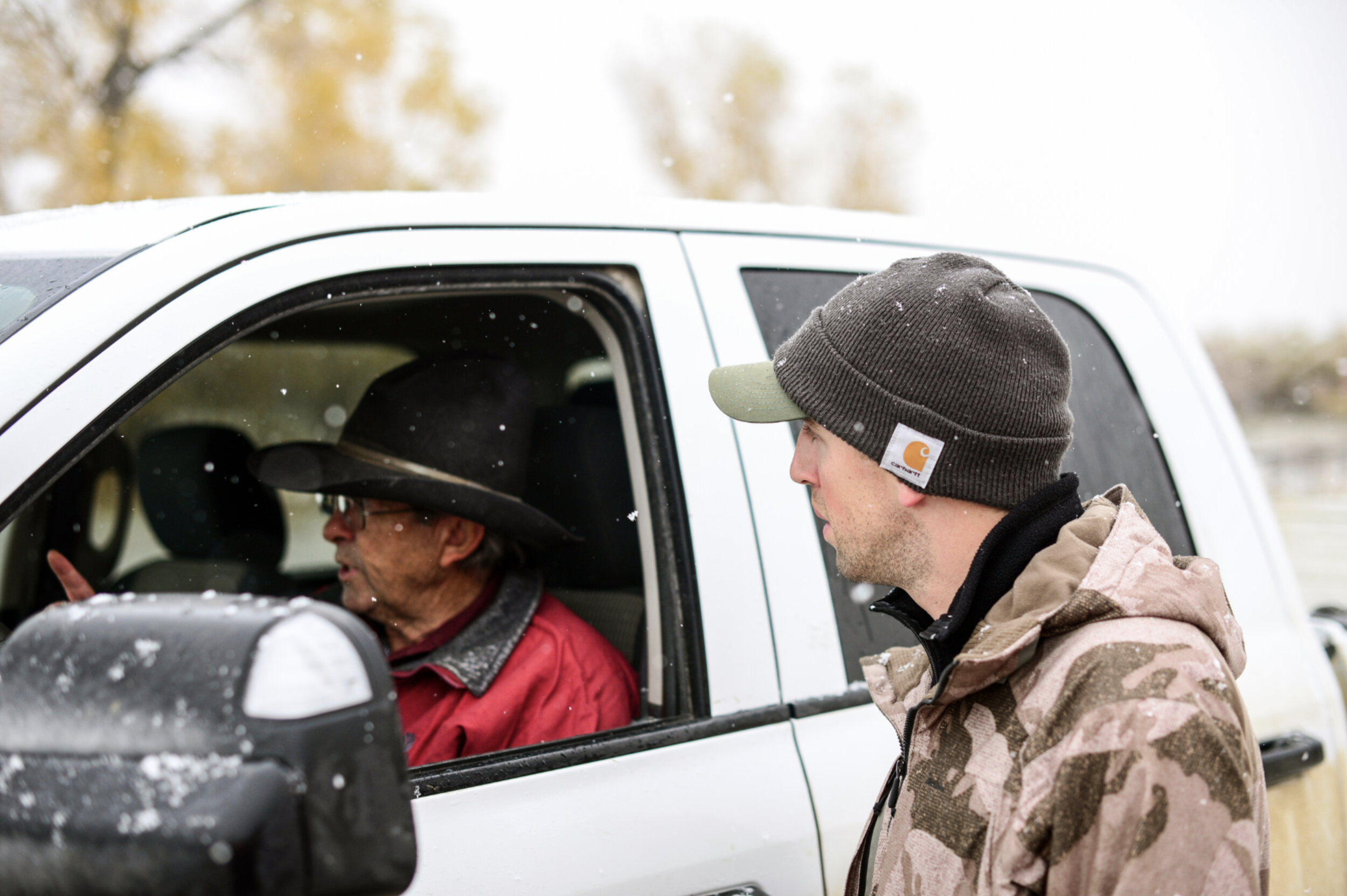
Common Ground
The Common Ground Program is dedicated to building trust, bridges, and relationships, and developing creative programs to improve wildlife management, support private land stewardship, maintain agriculture and working lands, and preserve our cultural heritage. We currently have 3 primary projects:
Meat Processing Revitalization: Bring resources together, and help to create a solution to local processing needs in Gallatin and Park counties.
Address Ranching Succession: LEARN (Landowner Education and Resource Network) is a multi-faceted effort to support private landowners to sustain profitable working lands and prepare for succession.

Master Hunter Program
In 2018, 1MT launched the Master Hunter Program to help the State of Montana and private landowners improve wildlife management efforts by restoring the cooperation between hunters, private landowners, and game managers.
Now, in its third year, the Master Hunter Program educates and certifies qualified hunters, and provides landowners with a pool of competent, ethical and responsible hunters to draw from when weighing options to manage wildlife populations on their land, and considering who to allow on their property to hunt. Program graduates complete a rigorous 60+ hours in classroom study, lectures, and skills training. Participants are required to excel in a variety of areas—history and ethics of conservation, landowner relations, noxious weed identification, wildlife management, and shooting proficiency just to name a few. This program illustrates stories of private landowners and their stewardship, and helps hunters understand the business enterprises that foster wildlife habitat and livelihoods tied to the management of the land. The Master Hunter Program goes beyond any other hunting certification program, and Montana Master Hunters truly earn their title.
The Master Hunter Program is a model for all states addressing wildlife management issues on private lands. By creating ambassadors for the sport of hunting the program also helps the image of hunting nationwide and preserves the culture of hunting. The Master Hunter Program helps build community and connect folks from both urban and rural areas across the state.
To date 165 hunters have graduated from our program and we have 200,000 acres enrolled in the program. In 2021 we plan to host four classes and graduate another 100-120 hunters, creating a cadre of up to 285 thoughtful hunters and ambassadors for the sport of hunting.
Learn more at MTMASTERHUNTER.COM
Meat Processing
1MT is leading and facilitating an effort to define opportunities, bring resources together, and help to create a solution to local processing needs in Gallatin and Park counties. This also includes an inventory of other conversations and projects happening across the state on the regional level, and compiling resources.
The shuttering of packing plants due to COVID-19 sent shock waves through our food supply system and exposed threats to our food security. But, it also has created opportunities to make systemic changes to make our system more innovative, more profitable for producers, and more satisfying for consumers. Finding the answer for regional processing will be a long-term effort, but there is pressing and unique opportunity to work on local challenges in the shorter term.
1MT is working to define the opportunities, bring resources together, and help to identify potential solutions and the partners that need to be in place for the solutions to happen. We also help identify funding needs and make connections between investors, entrepreneurs and producers, among a host of other things. At the same time, we are also conducting an inventory of conversations and projects happening across the state on the regional level, and compiling resources for folks involved in these conversations.
We established a working group, the “Meat Meet”, and are helping to coordinate more in-depth dialogue, structure solutions by connecting various parts of the supply and processing chain, and help find funding for the solutions to become reality. Members include ranchers, farmers, butchers, processors, retailers, investors, and local representatives. We are committed to assisting these entrepreneurs by connecting them to funding, partners, training, and planning grants.
To date, we have identified several specific needs in Gallatin and Park Counties and are working on a number of different projects. Two projects are moving forward quickly:
1. Clyde Park Meat Processing Revitalization: This is a collaboration to establish a local processing operation in Clyde Park. This project will also help address the backlog of processing needs by local producers as most of our facilities are booked through Spring 2021. 1MT is helping connect the parties to access grant and/or investor funding, and connect to other to area producers who need processing help.
2. Explore Processing Apprenticeship Program Viability: There is an immediate need for trained workforce in processing. Working with the MT Department of Labor, 1MT and the Western Sustainability Exchange (WSE) is exploring the opportunity to develop a workforce training and state-wide apprenticeship program. We are convening local area processors, representatives from MSU Extension and the Montana Manufacturing Extension Center, producers, and MT Department of Labor experts. The goal is to assess what already exists in the MT State University Northern and Miles City Community College programs, and create a complementary apprenticeship program that would be administered through MT Department of Labor and available to area-processors to help them attract, support, and retain staff.
LEARN
In 2020, we launched the Landowner Education and Resources Network (LEARN) is a multi-faceted effort to provide the tools, resources and case studies to support private landowners to sustain profitable working lands—to be able to hire emerging leaders, expand operations, start new enterprises, and prepare for succession.
LEARN is a direct result of talking with our stakeholders and learning about their needs. With the event of the coronavirus outbreak, 1MT took a step back to ask how we could support our stakeholders and what adjustments we should make to our programming while still meeting our mission. We reached out to our ranch and farming partners to listen and to learn about their challenges. We heard about a range of challenges from processing to commodity pricing, crop yield to debt load, healthcare to succession—all of which are interrelated. We saw an increasing need to provide new tools and strategies not only to help them address challenges on their lands, but also enhance the positive things that are happening in our rural communities and on the landscape, such as regenerative agriculture and soli health.A generation ago, passing on the family farm or ranch was a much simpler process because land values were lower and more family members remained involved in aspects of running the farm or ranch. With an aging population and less interest from family members, succession is a real, and ongoing issue. However, the number of new farmers and ranchers over 35 is on the rise. Many of these young people are coming through formal pathways (e.g. apprenticeship and graduate programs), and may fill critical roles in the agriculture industry as ranch managers, or work at agencies and nonprofits. Some will join family businesses with new, additive and complementary enterprises. Through LEARN, we hope to create opportunities for some of these leaders to start their own agricultural operations and become landowners themselves.
At the same time, landowners need the support and tools to understand how they can utilize and access this new talent. We aim to help landowners, particularly those with no successors, be better equipped to extend opportunities to work with these young farmers and ranchers and keep their land in agriculture. Understanding how to best onboard these newcomers by providing employment and equity opportunities after internship and apprenticeship is crucial. And, there is no existing effort doing this that we know of.
Further, LEARN meets 1MT’s mission in several way. We believe that LEARN has the potential to sustain more working lands so that fewer ranches and farms are lost to development or go idle, and help prepare more landowners for succession. LEARN will also help to continue to expand regenerative agriculture practices as these young agriculture leaders implement new practices and help teach existing landowners about new techniques and tools. LEARN will help Montana’s rural communities to remain economically viable and connected to our larger urban communities.
In 2020, we began building the program by identifying partners, and raising the funds to launch a pilot program in 2021.



